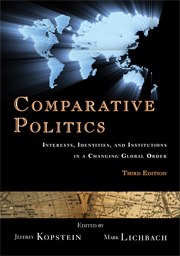Book contents
STOP AND COMPARE
from PART THREE - LATE DEVELOPERS
Summary
EARLY DEVELOPERS, MIDDLE DEVELOPERS, AND LATE DEVELOPERS
If it makes sense to group Britain and France as early developers and Japan and Germany together as middle developers, comparativists feel that it makes even more sense to group Russia and China together as late developers. Not only did both countries industrialize only in the twentieth century, but both also experienced communist revolutions and have lived with the long-term burdens of communist economic and institutional development. While Russia cast off its communist political institutions and ideology in 1991, it continues to search for a viable path into the capitalist world. Moreover, after initially moving in the direction of democracy after 1991, in the past five years Russia's rulers have become increasingly authoritarian. China, on the other hand, has retained its communist political structures but has done so while rapidly introducing capitalist economic institutions in important parts of the economy. These are the ironies that we examine in the case of the late developers.
LATE DEVELOPERS: RUSSIA AND CHINA
Compared with its European neighbors, Russia entered the twentieth century as a politically and economically backward country. As the core region of the tsarist empire, Russia had neither a constitution nor a working national parliament. Instead, Russia's tsar, Nicholas II, ruled as his father and grandfather had – as an autocrat unchecked by the power of law or political opposition.
- Type
- Chapter
- Information
- Comparative PoliticsInterests, Identities, and Institutions in a Changing Global Order, pp. 311 - 316Publisher: Cambridge University PressPrint publication year: 2008

